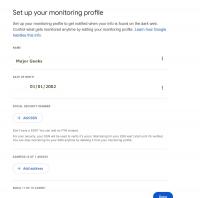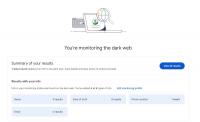Google's New Dark Web Report: How to Use It To Protect Your Data and Alternatives for Non-Google Users
By Corporal Punishmenton 04/17/2025 |
 Is your personal information lurking on the dark web? Probably. With data breaches becoming increasingly common and larger, Google has introduced a new feature called the "Dark Web Report" to help you stay informed, and it is handy as hell. Below, we will walk you through how to use this tool to secure your data and explore alternative resources for those outside the Google ecosystem.
Is your personal information lurking on the dark web? Probably. With data breaches becoming increasingly common and larger, Google has introduced a new feature called the "Dark Web Report" to help you stay informed, and it is handy as hell. Below, we will walk you through how to use this tool to secure your data and explore alternative resources for those outside the Google ecosystem.What is the Dark Web?
You've probably heard of the dark web. If you haven't, it's the term for the part of the internet where stolen data often ends up. The dark web gets its name not because it is hidden or really even that hard to find but is a part of the internet that is not indexed by traditional search engines like Google or Bing - usually by choice. Unlike the "Surface Web," which contains sites accessible through standard browsers, the Dark Web may require specific tools, such as Tor Browser, to access. Not all dark Websites are illegal, but the privacy-focused approach also makes them a hub for cybercriminal activity, such as trading stolen passwords, credit card numbers, and sensitive personal information.
Google's new "Dark Web Report" feature scans this area to identify if your personal data is at risk. Knowing whether your information has been compromised gives you the power to protect yourself.
Step-by-Step Guide: How to Use Google's Dark Web Report
1. Log In:First things first, make sure you're logged into your Google account. Without a Google account, this will not work. (Google has to know who it's helping, after all.)
2. Navigate to Your Google Account Settings: Click on your profile picture in the upper right-hand corner of your Google homepage. Then click on "Manage Your Google Account" or click here if you want to save some looking.
3. Go to the Security Tab: On the left-hand side, you'll see a menu with multiple tabs. Click on "Security." This will bring up a number of security options that are available to you. (This is probably a good time to take a second to review these options - making sure things like 2FA are set up. )
4. Find the Dark Web Report Section: Scroll down until you reach the "Dark Web Report" option. Google conveniently put it WAY at the bottom to ensure you're committed to finding the Dark Web options.
5. Run a Dark Web Scan: Once there, Google will automatically show you any pieces of your information—like your name, phone number, email address, etc.— that it already knows. Select what you would like to be monitored. Click Allow. You can now add more info you would like monitored, like Social Security numbers and additional emails and phone numbers.
6. Click done - and you will see your results.
If found, the "Dark Web Report" will also let you click on each breach, showing you what information was leaked and where it happened. To make it even better, Google will suggest steps to further secure your data.




Why Is This Important?
The dark web is where hackers often sell stolen data in secret marketplaces. This data is used in a number of ways --- none of those ways are good for you. Knowing that your information is compromised lets you be proactive. You can:
Privacy Considerations for Using Google's Dark Web Report
One of the biggest concerns people have online today is privacy. Google's Dark Web Report is a convenient tool, but it requires Google to have access to your information. Odd if you think about it. You have to give your private info to a company that will use your private info to market to you so that a criminal won't use your private info to steal from you. Google knows more about me now than I do, so this doesn't worry me. However, if you value privacy and prefer not to give Google any more data than necessary, you might want to consider alternatives.
Alternatives to Google's Dark Web Report
If you're not in the Google ecosystem or simply don't want Google to know even more about you, there are other ways to check if your data has been compromised:
Equifax: https://www.freeze.equifax.com/Freeze/jsp/SFF_PersonalIDInfo.jsp
Transunion: https://www.transunion.com/credit-freeze/place-credit-freez2
Experian: https://www.experian.com/freeze/center.html
Preventive Measures for Protecting Your Data: Here are some tips to help you prevent your data from ending up on the dark web.
Use Strong, Unique Passwords: Avoid using the same password across multiple accounts. Use a password manager to generate and store unique passwords for every account. We have a number of great password mangers listed. Try them and see what works best for you. https://www.majorgeeks.com/files/categories/password_managers.html
Enable Two-Factor Authentication: Adding another layer of security reduces the risk even if your password is compromised.
Avoid Phishing Scams: Be cautious when opening links or attachments in emails. Many data breaches begin with a simple phishing email. We have written a ton on the subject, Like Types of Phishing attacks and how to spot them - and even an e-book. https://buymeacoffee.com/majorgeeks/extras
https://www.majorgeeks.com/content/page/types_of_phishing_attacks_and_how_to_spot_them.html
Final Thoughts
Staying safe online in 2024 is a lot like keeping a squirrel out of your bird feeder—tricky but not impossible with enough vigilance and the right tools. With Google's new Dark Web Report feature, you have a powerful tool at your fingertips to ensure your data stays where it belongs: with you. It's 100% worth the effort. Don't wait for things to get out of hand; take a few minutes to check if any of your data has been compromised and take action preventative action.
And if Google isn't your thing, the alternatives mentioned above should do the trick.
Remember: You aren't being paranoid if they really are out to get you.

▶
Similar:
comments powered by Disqus





